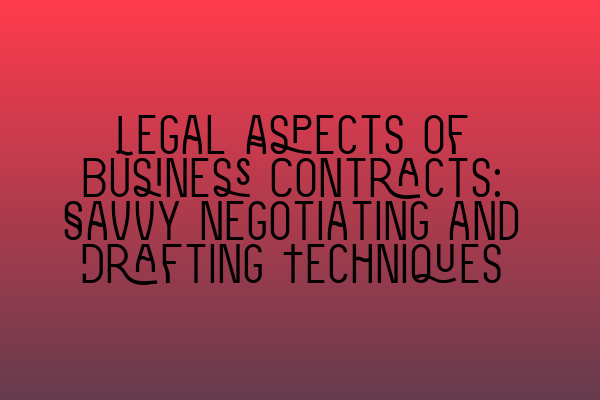Legal Aspects of Business Contracts: Savvy Negotiating and Drafting Techniques
Introduction
In the world of business, contracts serve as the foundation of all transactions. They provide a legally binding agreement that outlines the rights and obligations of all parties involved. A well-negotiated and properly drafted contract is crucial for companies to protect their interests and ensure smooth operations. This blog post will explore the essential legal aspects of business contracts, focusing on smart negotiating strategies and effective drafting techniques.
1. Understanding the Basics
Before delving into the strategies, it’s important to grasp the essential elements of a business contract. Included in these elements are the parties involved, their roles and responsibilities, the contract’s duration, payment terms, termination clauses, and dispute resolution mechanisms. A comprehensive understanding of these basics will facilitate effective negotiations.
2. Savvy Negotiating Techniques
Negotiating a business contract can be a complex process involving multiple parties with varying interests. To navigate these negotiations successfully and secure the most favorable terms, the following techniques can be employed:
a. Preparation and Research: Thoroughly research the other party’s track record, industry standards, and potential bargaining chips before entering into negotiations. This will give you a competitive advantage and enable you to identify areas where compromise may be possible.
b. Setting Clear Objectives: Define your own objectives and priorities before entering into negotiations. This will help you maintain focus and develop a strategy that aligns with your company’s goals.
c. Active Listening and Effective Communication: Actively listen to the other party’s concerns and viewpoints. Effective communication promotes understanding and collaboration, increasing the chances of reaching a mutually beneficial agreement.
d. Identifying Win-Win Solutions: Look for creative solutions that benefit both parties. By showcasing your commitment to finding mutually beneficial solutions, you’ll build trust and foster a positive negotiating environment.
e. Patience and Flexibility: Negotiations can be time-consuming, so exercise patience throughout the process. Be open to alternative options and willing to make concessions when appropriate.
3. The Art of Drafting
Drafting a contract requires precision and careful attention to detail. A well-drafted contract can minimize the risk of potential disputes and legal issues. Below are key techniques for effective contract drafting:
a. Clarity and Simplicity: Use clear, concise, and easily understandable language. Avoid jargon and legalese whenever possible, as it can lead to confusion and misinterpretation.
b. Comprehensive Scope: Ensure that the contract addresses all necessary aspects and leaves no room for ambiguity. Clearly define the rights and obligations of each party, as well as any necessary conditions or limitations.
c. Incorporating Applicable Laws: Familiarize yourself with relevant laws and regulations that may impact the contract. Ensure that the contract complies with these regulations and mitigates legal risks.
d. Realistic and Feasible Terms: Avoid including unrealistic or impractical terms in the contract. Ensure that all obligations and deadlines are reasonable and achievable.
e. Clear Dispute Resolution Mechanisms: Include a clear and detailed dispute resolution clause that outlines how potential conflicts will be addressed. This will help prevent lengthy legal battles and promote timely resolution.
Conclusion
Mastering the art of negotiating and drafting business contracts is a valuable skill for any company. By employing savvy negotiating techniques and implementing effective drafting strategies, businesses can protect their interests, minimize risks, and ensure smooth operations. Remember, preparation, clear communication, patience, and attention to detail are the keys to successful contract negotiations and drafting. By following these best practices, you can confidently navigate the legal aspects of business contracts and secure favorable outcomes for your company.
Contact SQE Contract Law
With extensive experience in contract law, our team at SQE Contract Law is here to assist you with all your legal needs. Whether you require guidance in contract negotiation, drafting, or dispute resolution, we have the expertise to protect your business interests. Contact us today for a consultation and let us help your business thrive through comprehensive contract solutions.
